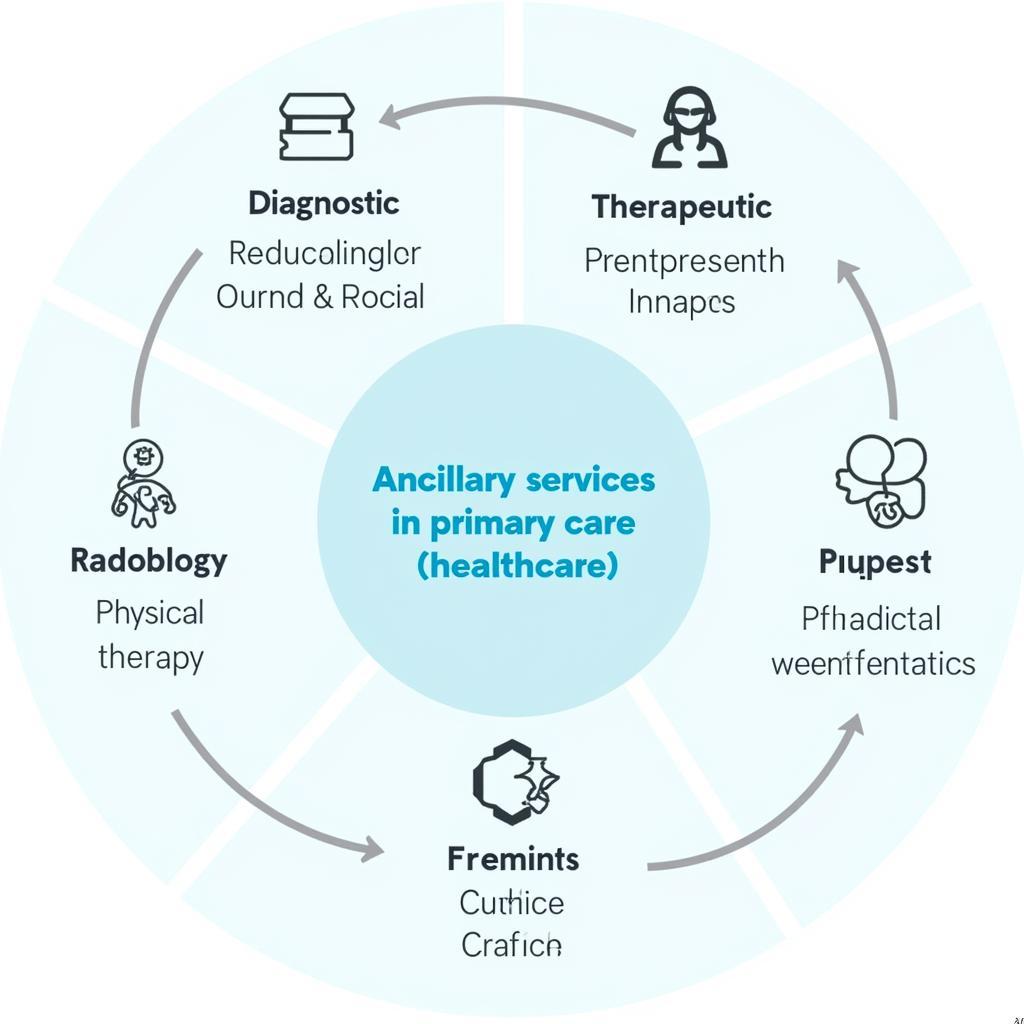Ancillary services in health care are supportive services that contribute to a patient’s overall health and well-being, complementing primary medical care. These services are essential for diagnosis, treatment, and recovery, covering a wide range of non-medical and paramedical specialties. Understanding what constitutes ancillary services is crucial for both patients and healthcare professionals.
Understanding Ancillary Services
Ancillary services encompass a diverse array of specialties beyond the scope of a primary care physician. They play a critical role in comprehensive patient care, offering specialized expertise and resources. These services are often provided by separate departments or facilities within a hospital or through independent providers. They can range from diagnostic imaging and laboratory testing to rehabilitation and therapy services.
Key Characteristics of Ancillary Services
- Specialized Expertise: Ancillary services are delivered by professionals with specific training and expertise in their respective fields. This specialized knowledge enhances the accuracy and effectiveness of diagnosis and treatment.
- Support for Primary Care: Ancillary services augment the care provided by primary care physicians, offering comprehensive solutions for patient health. They provide valuable information and support throughout the patient’s healthcare journey.
- Diverse Range of Services: Ancillary services encompass a broad spectrum of specialties, catering to various patient needs. From diagnostic testing to therapeutic interventions, these services contribute to a holistic approach to patient care.
- Accessibility and Convenience: Ancillary services are often conveniently located within or near healthcare facilities, streamlining access for patients. This centralized approach simplifies the coordination of care.
Common Examples of Ancillary Services
Several common examples illustrate the scope and importance of ancillary services in healthcare:
- Diagnostic Imaging: Services like X-rays, CT scans, and MRI scans provide crucial diagnostic information.
- Laboratory Services: Blood tests, urine analyses, and other laboratory procedures aid in diagnosis and monitoring of diseases.
- Physical Therapy: Rehabilitation services help patients regain physical function and mobility after injury or illness.
- Respiratory Therapy: These services assist patients with breathing difficulties and respiratory conditions.
- Occupational Therapy: Focuses on helping patients improve their ability to perform daily tasks and activities.
The Role of Ancillary Services in Patient Care
Ancillary services are integral to patient care, offering a multitude of benefits that contribute to improved health outcomes. They facilitate early diagnosis, personalized treatment plans, and comprehensive support throughout the recovery process.
Benefits of Ancillary Services
- Early and Accurate Diagnosis: Diagnostic imaging and laboratory services play a crucial role in identifying medical conditions early on, enabling timely interventions.
- Personalized Treatment Plans: Ancillary services provide valuable data that informs personalized treatment plans tailored to individual patient needs.
- Enhanced Recovery and Rehabilitation: Therapeutic services like physical and occupational therapy help patients regain function and independence, improving their quality of life.
- Improved Patient Outcomes: By providing comprehensive support and specialized expertise, ancillary services contribute to better patient outcomes and overall well-being.
“Ancillary services are not just add-ons,” says Dr. Emily Carter, a leading healthcare administrator. “They are essential components of a well-functioning healthcare system, ensuring that patients receive the comprehensive care they need.”
Conclusion
What is the definition of ancillary services in health care? They are the essential supporting services that complement primary medical care, encompassing a wide range of diagnostic, therapeutic, and support services. These services are vital for accurate diagnosis, personalized treatment, and successful recovery, ultimately leading to improved patient outcomes. Understanding the role and importance of ancillary services is crucial for both patients and healthcare professionals.
FAQs
- Are ancillary services covered by insurance? Coverage for ancillary services varies depending on the specific service and insurance plan.
- How do I access ancillary services? Your primary care physician can refer you to the appropriate ancillary service providers.
- What is the difference between ancillary services and primary care? Primary care focuses on general health and wellness, while ancillary services provide specialized support and treatment.
- Are ancillary services only offered in hospitals? No, ancillary services can also be provided in outpatient clinics and other healthcare settings.
- How can ancillary services improve patient outcomes? Ancillary services facilitate early diagnosis, personalized treatment, and comprehensive support, leading to better outcomes.
- Can I choose my ancillary service providers? Often, patients can choose their providers within their insurance network.
- What if I need multiple ancillary services? Your healthcare team will coordinate the various services to ensure seamless and integrated care.
is home health care an ancillary service
Need assistance? Contact us via WhatsApp: +1(641)206-8880 or Email: [email protected]. Our customer service team is available 24/7.



